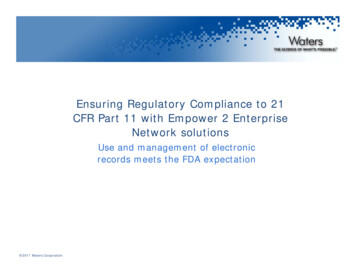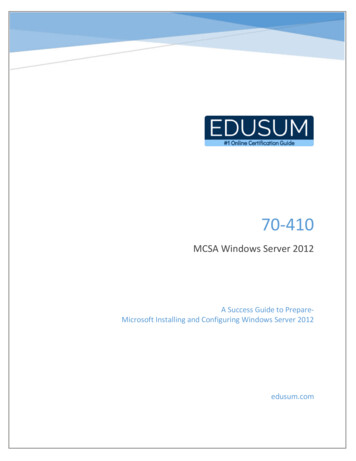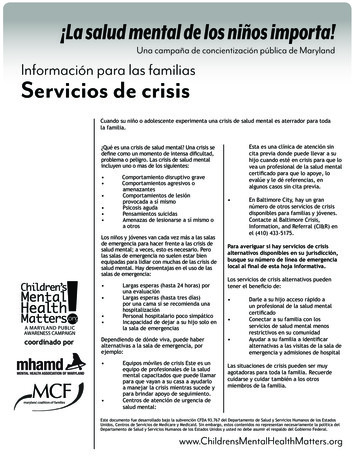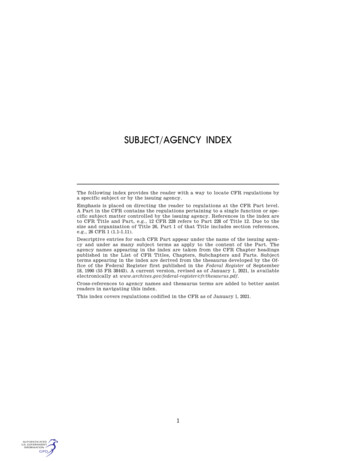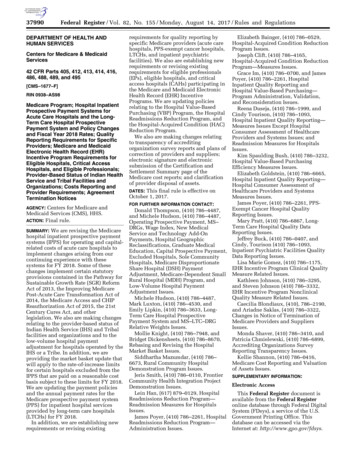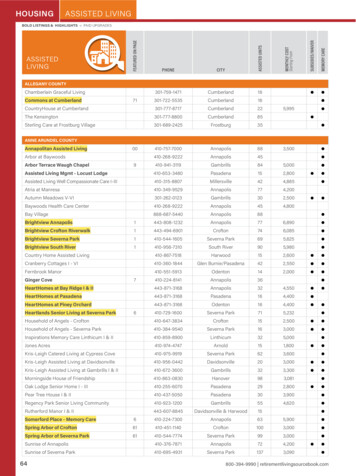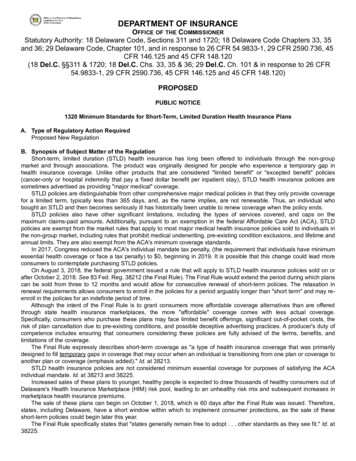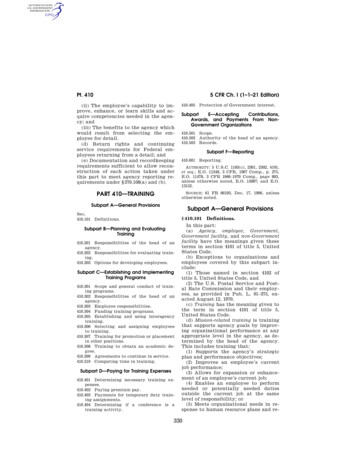
Transcription
Pt. 4105 CFR Ch. I (1–1–21 Edition)(ii) The employee’s capability to improve, enhance, or learn skills and acquire competencies needed in the agency; and(iii) The benefits to the agency whichwould result from selecting the employee for detail.(d) Return rights and continuingservice requirements for Federal employees returning from a detail; and(e) Documentation and recordkeepingrequirements sufficient to allow reconstruction of each action taken underthis part to meet agency reporting requirements under § 370.108(a) and s, and Payments From NonGovernment Organizations410.501410.502410.503Subpart F—Reporting410.601Reporting.AUTHORITY: 5 U.S.C. 1103(c), 2301, 2302, 4101,et seq.; E.O. 11348, 3 CFR, 1967 Comp., p. 275,E.O. 11478, 3 CFR 1966–1970 Comp., page 803,unless otherwise noted, E.O. 13087; and E.O.13152.Subpart A—General ProvisionsSubpart A—General Provisions§ 410.101Definitions.Subpart B—Planning and EvaluatingTraining410.201 Responsibilities of the head of anagency.410.202 Responsibilities for evaluating training.410.203 Options for developing employees.Subpart C—Establishing and ImplementingTraining Programs410.301 Scope and general conduct of training programs.410.302 Responsibilities of the head of anagency.410.303 Employee responsibilities.410.304 Funding training programs.410.305 Establishing and using interagencytraining.410.306 Selecting and assigning employeesto training.410.307 Training for promotion or placementin other positions.410.308 Training to obtain an academic degree.410.309 Agreements to continue in service.410.310 Computing time in training.Subpart D—Paying for Training Expensesrmajette on DSKBCKNHB2PROD with CFRScope.Authority of the head of an agency.Records.SOURCE: 61 FR 66193, Dec. 17, 1996, unlessotherwise noted.PART 410—TRAININGSec.410.101Protection of Government interest.410.401 Determining necessary training expenses.410.402 Paying premium pay.410.403 Payments for temporary duty training assignments.410.404 Determining if a conference is atraining activity.Definitions.In this part:(a) Agency, employee, Government,Government facility, and non-Governmentfacility have the meanings given theseterms in section 4101 of title 5, UnitedStates Code.(b) Exceptions to organizations andemployees covered by this subpart include:(1) Those named in section 4102 oftitle 5, United States Code, and(2) The U.S. Postal Service and Postal Rate Commission and their employees, as provided in Pub. L. 91–375, enacted August 12, 1970.(c) Training has the meaning given tothe term in section 4101 of title 5,United States Code.(d) Mission-related training is trainingthat supports agency goals by improving organizational performance at anyappropriate level in the agency, as determined by the head of the agency.This includes training that:(1) Supports the agency’s strategicplan and performance objectives;(2) Improves an employee’s currentjob performance;(3) Allows for expansion or enhancement of an employee’s current job;(4) Enables an employee to performneeded or potentially needed dutiesoutside the current job at the samelevel of responsibility; or(5) Meets organizational needs in response to human resource plans and re-330VerDate Sep 11 201411:23 Jul 28, 2021Jkt 253008PO 00000Frm 00340Fmt 8010Sfmt 8010Y:\SGML\253008.XXX253008
Office of Personnel Management§ 410.301engineering, downsizing, restructuring,and/or program changes.(e) Retraining means training and development provided to address an individual’s skills obsolescence in the current position and/or training and development to prepare an individual for adifferent occupation, in the same agency, in another Government agency, orin the private sector.(f) Continued service agreement has themeaning given to service agreementsin section 4108 of title 5, United StatesCode.(g) Interagency training means training provided by one agency for otheragencies or shared by two or moreagencies.(h) State and local government havethe meanings given to these terms bysection 4762 of title 42, United StatesCode.(i) Established contact hours are thenumber of academic credit hours assigned to a course(s) times the numberof weeks in a term times the number ofterms required to complete the degree.[61 FR 66193, Dec. 17, 1996, as amended at 69FR 33276, June 15, 2004]rmajette on DSKBCKNHB2PROD with CFRSubpart B—Planning andEvaluating Trainingachieved, and the delegation of training approval authority to the lowestappropriate level;(c) Establish priorities for trainingemployees and allocate resources according to those priorities; and(d) Develop and maintain plans andprograms that:(1) Identify mission-critical occupations and competencies;(2) Identify workforce competencygaps;(3) Include strategies for closing competency gaps; and(4) Assess periodically, but not lessoften than annually, the overall agencytalent management program to identify training needs within the agencyas required by section 303 of ExecutiveOrder 11348.[74 FR 65387, Dec. 10, 2009]§ 410.202 Responsibilitiesating training.forAgencies must evaluate their training programs annually to determinehow well such plans and programs contribute to mission accomplishment andmeetorganizationalperformancegoals.[74 FR 65387, Dec. 10, 2009]§ 410.201 Responsibilities of the headof an agency.Agency employee development plansand programs should be designed tobuild or support an agency workforcecapable of achieving agency missionand performance goals and facilitatingcontinuous improvement of employeeand organizational performance. In developing strategies to train employees,heads of agencies or their designee(s),under section 4103 of title 5, UnitedStates Code, and Executive Order 11348,are required to:(a) Establish, budget for, operate,maintain, and evaluate plans and programs for training agency employeesby, in, and through Government ornon-Government facilities, as appropriate;(b) Establish policies governing employee training, including a statementof the alignment of employee trainingand development with agency strategicplans, the assignment of responsibilityto ensure the training goals are§ 410.203 Options for developing employees.Agencies may use a full range of options to meet their mission-related organizational and employee development needs, such as classroom training, on-the-job training, technologybased training, satellite training, employees’ self-development activities,coaching, mentoring, career development counseling, details, rotational assignments, cross training, and developmental activities at retreats and conferences.[61 FR 66193, Dec. 17, 1996. Redesignated at 74FR 65388, Dec. 10, 2009]Subpart C—Establishing andImplementing Training Programs§ 410.301 Scope and general conduct oftraining programs.(a) Authority. The requirements forestablishing training programs andplans are found in section 4103(a) of331VerDate Sep 11 201411:23 Jul 28, 2021Jkt 253008PO 00000Frm 00341evalu-Fmt 8010Sfmt 8010Y:\SGML\253008.XXX253008
§ 410.3025 CFR Ch. I (1–1–21 Edition)title 5, United States Code, and Executive Order 11348.(b) Alignment with other human resource functions. Training programs established by agencies under chapter 41of title 5, United States Code, should beintegrated with other personnel management and operating activities,under administrative agreements asappropriate, to the maximum possibleextent.rmajette on DSKBCKNHB2PROD with CFR§ 410.302 Responsibilities of the headof an agency.(a) Specific responsibilities. (1) Thehead of each agency must prescribeprocedures as are necessary to ensurethat the selection of employees fortraining is made without regard torace, color, religion, sex (includingpregnancy and gender identity), national origin, age (as defined by theAge Discrimination in EmploymentAct of 1967, as amended), disability, genetic information (including familymedical history), marital status, political affiliation, sexual orientation,labor organization affiliation or nonaffiliation, status as parent, or anyother non-merit-based factor, unlessspecifically designated by statute as afactor that must be taken into consideration when awarding such benefits,or retaliation for exercising rights withrespect to the categories enumeratedabove, where retaliation rights areavailable, and with proper regard fortheir privacy and constitutional rightsas provided by merit system principlesset forth in 5 U.S.C. 2301(b)(2).(2) The head of each agency shall prescribe procedures as are necessary toensure that the training facility andcurriculum are accessible to employeeswith disabilities.(3) The head of each agency shall notallow training in a facility that discriminates in the admission or treatment of students.(b)(1) Training of Presidential appointees. The Office of Personnel Management delegates to the head of eachagency authority to authorize trainingfor officials appointed by the President. In exercising this authority, thehead of an agency must ensure that thetraining is in compliance with chapter41 of title 5, United States Code, andwith this part. This authority may notbe delegated to a subordinate.(2) Records. When exercising this delegation of authority, the head of anagency must maintain records that include:(i) The name and position title of theofficial;(ii) A description of the training, itslocation, vendor, cost, and duration;and(iii) A statement justifying the training and describing how the official willapply it during his or her term of office.(3) Review of delegation. Exercise ofthis authority is subject to U.S. Officeof Personnel Management review.(c) Training for the head of an agency.Since self-review constitutes a conflictof interest, heads of agencies must submit their own requests for training tothe U.S. Office of Personnel Management for approval.(d) The head of the agency shall establish the form and manner of maintaining agency records related to training plans, expenditures, and activities.(e) The head of the agency shall establish written procedures which coverthe minimum requirements for continued service agreements. (See also 5CFR 410.310.)(f) The head of each agency shall prescribe procedures, as authorized by section 402 of Executive Order No. 11348,for obtaining U.S. Department of Stateadvice before assigning an employeewho is stationed within the continentallimits of the United States to trainingoutside the continental United Statesthat is provided by a foreign government, international organization, orinstrumentality of either.[61 FR 66193, Dec. 17, 1996, as amended at 63FR 43867, Aug. 17, 1998; 79 FR 43923, July 29,2014]§ 410.303 Employee responsibilities.Employees are responsible for self-development, for successfully completingand applying authorized training, andfor fulfilling continued service agreements. In addition, they share withtheir agencies the responsibility toidentify training needed to improve individual and organizational performance and identify methods to meetthose needs, effectively and efficiently.332VerDate Sep 11 201411:23 Jul 28, 2021Jkt 253008PO 00000Frm 00342Fmt 8010Sfmt 8010Y:\SGML\253008.XXX253008
Office of Personnel Management§ 410.307§ 410.304 Funding training programs.Section 4112 of title 5, United StatesCode, provides for agencies paying thecosts of their training programs andplans from applicable appropriations orfrom other funds available. Trainingcosts associated with program accomplishment may be funded by appropriations applicable to that program area.In addition, section 4109(a)(2) of title 5,United States Code, provides authorityfor agencies and employees to sharethe expenses of training.rmajette on DSKBCKNHB2PROD with CFR§ 410.305 Establishing and using interagency training.Executive departments, independentestablishments, Government corporations subject to chapter 91 of title 31,the Library of Congress, and the Government Printing office may provide orshare training programs developed forits employees of other agencies undersection 4120 of title 5, United StatesCode, when this would result in bettertraining, improved service, or savingsto the Government. Section 302(d) ofExecutive Order 11348 allows agenciesexcluded from section 4102 of title 5,United States Code, to also receiveinteragency training when this wouldresult in better training, improvedservice, or savings to the Government.Section 201(e) of Executive Order 11348provides for the Office of PersonnelManagement to coordinate interagencytraining conducted by and for agencies(including agencies and portions ofagencies excepted by section 4102(a) ofTitle 5, United States Code).§ 410.306 Selecting and assigning employees to training.(a) Each agency shall establish criteria for the fair and equitable selection and assignment of employees totraining consistent with merit systemprinciplesspecifiedin5U.S.C.2301(b)(1) and (2).(b) Persons on IntergovernmentalPersonnel Act mobility assignmentsmay be assigned to training if thattraining is in the interest of the Government.(1) A State or local government employee given an appointment in a Federal agency under the authority of section 3374(b) of title 5 of the UnitedStates Code, is deemed an employee ofthe Federal agency. The agency mayprovide training for the State or localgovernment employee as it does forother agency employees.(2) A State or local government employee on detail to a Federal agencyunder the authority of section 3374(c)of title 5 of the United States Code, isnot deemed an employee of the Federalagency. However, the detailed State orlocal government employee may be admitted to training programs the agency has established for Federal personnel and may be trained in the rules,practices, procedures and/or systemspertaining to the Federal government.(c) Subject to the prohibitions of§ 410.308(a) of this part, an agency maypay all or part of the training expensesof students hired under the Student Career Experience Program (see 5 CFR213.3202(d)(10)).[61 FR 66193, Dec. 17, 1996; 61 FR 68119, Dec.27, 1996]§ 410.307 Training for promotion orplacement in other positions.(a) General. In determining whetherto provide training under this section,agencies should take into account:(1) Agency authority to modify qualification requirements in certain situations as provided in the OPM OperatingManual for Qualification Standards forGeneral Schedule Positions;(2) Agency authority to establishtraining programs that provide intensive and directly job-related trainingto substitute for all or part of the experience (but not education, licensing,certification, or other specific credentials), required by OPM qualificationstandards. Such training programsmay be established to provide employees with the opportunity to acquire theexperience and knowledge, skills, andabilities necessary to qualify for another position (including at a highergrade) at an accelerated rate; and(3) Time-in-grade restrictions on advancement (see 5 CFR 300.603(b)(6)).(b) Training for promotion. Under theauthority of 5 U.S.C. 4103, and consistent with merit system principlesset forth in 5 U.S.C. 2301(b)(1) and (2),an agency may provide training to nontemporary employees that in certaininstances may lead to promotion. Anagency must follow its competitive333VerDate Sep 11 201411:23 Jul 28, 2021Jkt 253008PO 00000Frm 00343Fmt 8010Sfmt 8010Y:\SGML\253008.XXX253008
rmajette on DSKBCKNHB2PROD with CFR§ 410.3085 CFR Ch. I (1–1–21 Edition)procedures under part 335 of this chapter when selecting a non-temporaryemployee for training that permitsnoncompetitive promotion after successful completion of the training.(c) Training for placement in otheragency positions, in other agencies, oroutside Government—(1) Grade or pay retention. Under the authority of 5 U.S.C.4103 and 5 U.S.C. 5364, an agency maytrain an employee to meet the qualification requirements of another position in the agency if the new positionis at or below the retained grade or thegrade of the position the employee heldbefore pay retention.(2) Training for placement in anotheragency. Under the authority of 5 U.S.C.4103(b), and consistent with merit system principles set forth in 5 U.S.C.2301, an agency may train an employeeto meet the qualification requirementsof a position in another agency if thehead of the agency determines thatsuch training would be in the interestof the Government.(i) Before undertaking any trainingunder this section, the head of theagency shall determine that there exists a reasonable expectation of placement in another agency.(ii) When selecting an employee fortraining under this section, the head ofthe agency shall consider:(A) The extent to which the employee’s current skills, knowledge, andabilities may be utilized in the new position;(B) The employee’s capability tolearn skills and acquire knowledge andabilities needed in the new position;and(C) The benefits to the Governmentwhich would result from retaining theemployee in the Federal service.(3) Training displaced or surplus employees. Displaced or surplus employeesas defined in 5 CFR 330.602 may be eligible for training or retraining for positions outside Government through programs provided under 29 U.S.C. 1651, orsimilar authorities. An agency may useits appropriated funds for training displaced or surplus employees for positions outside Government only whenspecifically authorized by legislationto do so.(4) Career transition assistance plans.Under 5 CFR part 330, subpart F, agen-cies are required to establish careertransition assistance plans (CTAP) toprovide career transition services todisplaced and surplus employees.(i) Under the authority of 5 U.S.C.4109, an agency may:(A) Train employees in the use of theCTAP services;(B) Provide vocational and career assessment and counseling services;(C) Train employees in job searchskills, techniques, and strategies; and(D) Pay for training related expensesas provided in 5 U.S.C. 4109(a)(2).(ii) Agency CTAP’s will include plansfor retraining displaced or surplus employees covered by this part.[61 FR 66193, Dec. 17, 1996, as amended at 75FR 67605, Nov. 3, 2010]§ 410.308 Training to obtain an academic degree.(a) An agency may authorize trainingfor an employee to obtain an academicdegree under conditions prescribed at 5U.S.C. 4107(a).(b) Colleges and universities participating in an academic degree trainingprogram must be accredited by a nationally recognized body. A ‘‘nationally recognized body’’ is a regional, national, or international accrediting organization recognized by the U.S. Department of Education. The listing ofaccrediting bodies is available throughthe Department.(c) The selection of employees for anacademic degree training programmust follow the requirements of§ 335.103(b)(3), § 335.103(c)(1)(iii), and subpart A of part 300 of this chapter. Theselection and assignment must be accomplished to meet one or more of thecriteria identified in 5 U.S.C. 4107(a).Therefore, an agency may competitively select and assign an employee toan academic degree training programthat qualifies the employee for promotion to a higher graded position orto a position that requires an academicdegree.(d) Agency heads must assess andmaintain records on the effectivenessof training assignments under this section.(e) On a periodic basis, OPM may request agency information on the use334VerDate Sep 11 201411:23 Jul 28, 2021Jkt 253008PO 00000Frm 00344Fmt 8010Sfmt 8010Y:\SGML\253008.XXX253008
Office of Personnel Management§ 410.402and effectiveness of training assignments under this section.[69 FR 33277, June 15, 2004]§ 410.309 Agreements to continue inservice.(a) Authority. Continued serviceagreements are provided for in section4108 of title 5, United States Code.Agencies have the authority to determine when such agreements will be required.(b) Requirements. (1) The head of theagency shall establish written procedures which include the minimum requirementsforcontinuedserviceagreements. These requirements shallinclude procedures the agency considers necessary to protect the Government’s interest should the employeefail to successfully complete training.(2) An employee selected for trainingsubject to an agency continued serviceagreement must sign an agreement tocontinue in service after training priorto starting the training. The period ofservice will equal at least three timesthe length of the training.(3) The head of an agency shall establish procedures to compute length oftraining period for academic degreetraining programs in accordance with§ 410.310(d).(c) Failure to fulfill agreements. With asigned agreement, the agency has aright to recover training costs, exceptpay or other compensation, if the employee voluntarily separates from Government service. The agency shall provide procedures to enable the employeeto obtain a reconsideration of the recovery amount or to appeal for a waiver of the agency’s right to recover.[61 FR 66193, Dec. 17, 1996; 63 FR 72097, Dec.31, 1998, as amended at 69 FR 33277, June 15,2004]rmajette on DSKBCKNHB2PROD with CFR§ 410.310Computing time in training.For the purpose of computing time intraining for continued service agreements under section 4108 of title 5,United States Code:(a) An employee on an 8-hour daywork schedule assigned to training iscounted as being in training for thesame number of hours he or she is inpay status during the training assignment. If the employee is not in pay sta-tus during the training, the employeeis counted as being in training for thenumber of hours he or she is grantedleave without pay for the purpose ofthe training.(b) For an employee on an alternative work schedule, the agency is responsible for determining the numberof hours the employee is in pay statusduring the training assignment. If theemployee is not in pay status duringthe training, the employee is countedas being in training for the number ofhours he or she is granted leave without pay for the purpose of the training.(c) An employee on an 8-hour or analternative work schedule assigned totraining on less than a full-time basisis counted as being in training for thenumber of hours he or she spends inclass, in formal computer-based training, in satellite training, in formalself-study programs, or with the training instructor, unless a different method is determined by the agency.(d) When an employee is pursuing anacademic degree through an agencyacademic degree training program, anagency may compute the length of theacademic degree training period basedon the academic institution’s established contact hours.[61 FR 66193, Dec. 17, 1996, as amended at 69FR 33277, June 15, 2004]Subpart D—Paying for TrainingExpenses§ 410.401 Determining necessary training expenses.(a) The head of an agency determineswhich expenses constitute necessarytraining expenses under section 4109 oftitle 5, United States Code.(b) An agency may pay, or reimbursean employee, for necessary expenses incurred in connection with approvedtrainingasprovidedinsection4109(a)(2) of title 5, United States Code.Necessary training expenses do not include an employee’s pay or other compensation.§ 410.402Paying premium pay.(a) Prohibitions. Except as provided byparagraph (b) of this section, an agencymay not use its funds, appropriated orotherwise available, to pay premium335VerDate Sep 11 201411:23 Jul 28, 2021Jkt 253008PO 00000Frm 00345Fmt 8010Sfmt 8010Y:\SGML\253008.XXX253008
rmajette on DSKBCKNHB2PROD with CFR§ 410.4035 CFR Ch. I (1–1–21 Edition)pay to an employee engaged in trainingby, in, or through Government or nongovernment facilities.(b) Exceptions. The following are excepted form the provision in paragraph(a) of this section prohibiting the payment of premium pay:(1) Continuation of premium pay. Anemployee given training during a period of duty for which he or she is already receiving premium pay for overtime, night, holiday, or Sunday workshall continue to receive that premiumpay. This exception does not apply toan employee assigned to full-timetraining at institutions of higher learning.(2) Training at night. An employeegiven training at night because situations that he or she must learn to handle occur only at night shall be paid bythe applicable premium pay.(3) Cost savings. An employee giventraining on overtime, on a holiday, oron a Sunday because the costs of thetraining, premium pay included, areless than the costs of the same trainingconfined to regular work hours shall bepaid the applicable premium pay.(4) Availability pay. An agency shallcontinue to pay availability pay duringagency-sanctioned training to a criminal investigator who is eligible for itunder 5 U.S.C. 5545a and implementingregulations. Agencies may, at their discretion, provide availability pay to investigators during periods of initial,basic training. (See 5 CFR 550.185 (b)and (c).)(5) Standby and administratively uncontrollable duty. An agency may continue to pay annual premium pay forregularly scheduled standby duty oradministratively uncontrollable overtime work, during periods of temporaryassignment for training as provided by5 CFR 550.162(c).(6) Firefighter overtime pay. (i) A firefighter compensated under part 550,subpart M, of this chapter shall receivebasic pay and overtime pay for the firefighter’s regular tour of duty (as defined in § 550.1302 of this chapter) in anyweek in which attendance at agencysanctioned training reduces the hoursin the firefighter’s regular tour ofduty.(ii) The special pay protection provided by paragraph (b)(6)(i) of this sec-tion does not apply to firefighters whovoluntarily participate in training during non-duty hours, leave hours, or periods of excused absence. It also doesnot apply if the firefighter is entitledto a greater amount of pay based on actual work hours during the week inwhich training occurs.(7) Agency exemption. An employeegiven training during a period not otherwise covered by a provision of thisparagraph may be paid premium paywhen the employing agency has beengranted an exception to paragraph (a)of this section by the U.S. Office ofPersonnel Management.(8) Border Patrol agent overtime supplement. A Border Patrol agent may receive an overtime supplement under 5U.S.C. 5550 and 5 CFR part 550, subpartP, during training, subject to the limitation in 5 U.S.C. 5550(b)(2)(G) and(b)(3)(G) and 5 CFR 550.1622(b).(c) An employee who is exceptedunder paragraph (b) of this section iseligible to receive premium pay in accordance with the applicable pay authorities.(d) Regulations governing overtimepay for employees covered by FairLabor Standards Act (FLSA) duringtraining, education, lectures, or conferences are found in § 551.423 of thischapter. The prohibitions on payingpremium pay found in paragraph (a) ofthis section are not applicable for thepurpose of paying FLSA overtime pay.(e) Compensation for time spent traveling to and from training. (1) Compensation provisions are contained in 5CFR 550.112(g) for time spent travelingfor employees subject to title 5 of theUnited States Code.(2) Compensation provisions are contained in 5 CFR 551.422 for time spenttraveling for employees covered by theFair Labor Standards Act. (See also 29CFR 785.33 through § 785.41.)[61 FR 66193, Dec. 17, 1996, as amended at 63FR 64592, Nov. 23, 1998; 64 FR 69172, Dec. 10,1999; 67 FR 15466, Apr. 2, 2002; 80 FR 58111,Sept. 25, 2015]§ 410.403 Payments for temporary dutytraining assignments.Section 4109(a)(2) of title 5, UnitedStates Code, provides that an agencymay pay, or reimburse an employee336VerDate Sep 11 201411:23 Jul 28, 2021Jkt 253008PO 00000Frm 00346Fmt 8010Sfmt 8010Y:\SGML\253008.XXX253008
rmajette on DSKBCKNHB2PROD with CFROffice of Personnel Management§ 410.501for, all or a part of the necessary expenses of training, including the necessary costs of travel; per diem expenses; or limited relocation expensesincluding transportation of the immediate family, household goods and personal effects:(a) If an agency chooses to pay perdiem, or in unusual circumstances theactual subsistence, expenses for an employee on a temporary duty trainingassignment, payment must be in accordance with 41 CFR part 301–7 or 41CFR part 301–8 (or, for commissionedofficers of the National Oceanic andAtmospheric Administration, in accordance with sections 404 and 405 oftitle 37, United States Code, and theJoint Federal travel Regulations forthe Uniformed Services).(b) An agency may pay a reduced perdiem rate, such as a standardized payment less than the maximum per diemrate for a geographical area. If a reduced or standardized per diem ratewas not authorized in advance of thetravel and the fees paid to a traininginstitution include lodging or mealcosts, an appropriate deduction shallbe made from the total per diem ratepayable on the travel voucher (see 41CFR 301–7.12).(c) An agency may pay limited relocation expenses for the transportationof the employee’s immediate family,household goods and personal effects,including packing, crating, temporarily storing, draying, and unpackingthe household goods in accordance withsection 5724 of title 5, United StatesCode (or, for commissioned officers ofthe National Oceanic and AtmosphericAdministration, in accordance withsections 406 and 409 of title 37, UnitedStates Code, and the Joint federal travel Regulations for the uniformed Services). Limited relocation expenses arepayable only when the estimated costsof transportation and related servicesare less than the estimated aggregateper diem or actual subsistence expensepayments for the period of training. Anemployee selected for temporary dutytraining may receive travel and perdiem (or actual subsistence expenses)for the period of the assignment orpayment of limitedpenses, but not both.relocation[61 FR 66193, Dec. 17, 1996; 61 FR 66821, Dec.30, 1996]§ 410.404 Determining if a conferenceis a training activity.Agencies may sponsor an employee’sattendance at a conference as a developmental assignment under section4110 of title 5, United States Code,when—(a) The announced purpose of theconference is educational or i
learn skills and acquire knowledge and abilities needed in the new position; and (C) The benefits to the Government which would result from retaining the employee in the Federal service. (3) Training displaced or surplus em-ployees. Displaced or surplus employees as defined in 5 CFR 330.602 may be eli-gible for training or retraining for posi-

